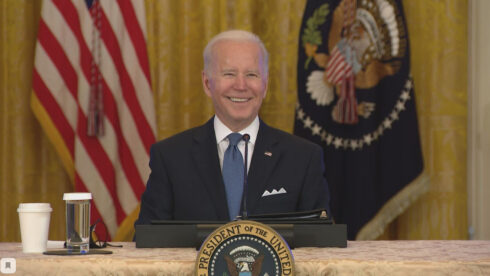Scepticism persists on the success of Biden’s $1.2 trillion Infrastructure and Jobs Investment Act.
Written by Paul Antonopoulos, independent geopolitical analyst
US President Joe Biden claimed that with his economic strategy, “Americans are dreaming again – believing in themselves and America.” He also celebrated the fact that the US overcame Chinese economic growth for the first time in two decades.
According to the president, the figures show that his administration is “finally building an American economy for the 21st Century, and I urge Congress to continue this momentum by passing legislation to make America more competitive.” But the biggest celebration came at the end of the text, with Biden saying that “for the first time in 20 years, our economy grew faster than China’s.”
Biden also stated that all economic development “is no accident” since his economic strategy aims to create good jobs, rebuild manufacturing and strengthen the country’s supply chains.
However, even with the possible good winds in the economy, the Democrat’s popularity index is low. In a survey conducted by the Pew Research Center and released on Tuesday, the president’s approval was 41%, while in September last year it was at 44%.
It is recalled that last year, the House of Representatives approved the Infrastructure and Jobs Investment Act, whose value of $1.2 trillion is expected to “grow the economy, enhance [US] competitiveness, create good jobs, and make [the US] economy more sustainable, resilient, and just.” Biden also claimed that the infrastructure project will help the US win the economic competition against China.
The US government explained that the Investment Act was “a once-in-a-generation investment in our infrastructure” to create “good-paying union jobs” for vital infrastructural projects like roads, railways and bridges, as well as putting the country on a path to “win in the 21st century.” However, as impressive as this mega $1.2 trillion project sounds, there is huge scepticism on its success and the cost of it, especially as the US already has an astronomical $29.8 trillion debt.
The social spending package is the wrong thing that could be done for American prosperity, warned Arthur Betz Laffer, a member of Ronald Reagan’s Economic Policy Advisory Council (1981-1989). In a virtual conversation on the Just The News portal in October 2021, Laffer said that Biden’s bill “is a catastrophe and will hurt the economy for generations to come.”
“I don’t understand why any Dems would vote for this bill,” he continued. “It’s bad for Democrats. It’s bad for the poor. It’s bad for minorities, the undereducated, the disenfranchised. It’s a bad bill for everyone in this country.”
Laffer suggested that the $3.5 trillion package will cost much more than that amount, especially with “unfunded liabilities of government programs.” To make matters worse, the current size of the federal deficit and the debt-to-GDP ratio is “unprecedented in peacetime in the United States’ history. It puts us in third-world country status.”
Earlier in January, data showed that the consumer price index hit a 7% annual gain in December, the fastest increase since June 1982 when Laffer was a part of the Reagan administration fighting to stabilize soaring inflation. In that context, Laffer slammed Biden for doing “exactly the opposite” of what he says is needed to tame an inflation rate of 7% – the highest for 40 years.
Although the US economy grew last year at the fastest pace since Reagan’s presidency, bouncing back with resilience from 2020’s brief but devastating pandemic recession, the economy is expected to slow this year. The International Monetary Fund forecasts that the GDP growth will slow to 4% in the US, whilst China is predicted to grow 4.8% this year. For all the celebration that the US growth rate outpaced China in 2021 for the first time in two decades, this achievement will likely be for a solitary year and off the back of a recession followed by an unprecedented $1.2 trillion Investment Act.
However, as expressed by Laffer, many economists have their doubts about the success of the Investment Act. Inflation is also at a high level, and infrastructurally, the US is many years behind China, let alone the added advantage of significant Chinese infrastructural projects outside of its own borders. Although Biden and Western media are celebrating that the US achieved a higher growth rate than China last year, it will likely only be for a single year.
It is recalled that a report from the Costs of War project at Brown University revealed that 20 years of post-9/11 wars have cost the US an estimated $8 trillion, whilst China has not been at war since the 1979 Sino-Vietnamese War. One can only imagine how far much further advanced infrastructurally, socially and economically the US would be if those trillions of dollars were spent on initiatives other than foreign wars and occupations. It also gives perspective on how the US state prioritises having a global hegemony rather than improving the economy and infrastructure of the country for everyday citizens.





Neoliberalism is failing!
Bridges are falling: Pittsburgh bridge collapses hours before Biden’s visit!
Bridge collapses in Pittsburgh, hours before Biden arrives to tout infrastructure package.
At least 10 people sustained non-life-threatening injuries, officials said. According to an analysis, addressing the structural issues of Pittsburgh’s nearly 450 bridges would cost $458 million.